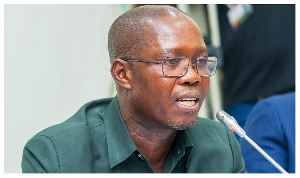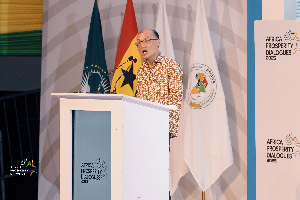The Private Enterprise Federation (PEF) has expressed outrage at government’s new subsidies culture, describing it as an attempt to “bankrupt the private sector”.
The CEO of PEF, Nana Osei Bonsu, said government’s shot at introducing subsidies into the petroleum sector in an attempt to mitigate hardship on the poor and vulnerable is a baseless move that could cripple the private sector.
“The position of PEF is there is no reason for subsidy. Even if government had the resources, they could use that to do better things in impacting on the most vulnerable, job-creation and income generation.
“When you subsidise a product you skew the market pricing mechanism and there is no resource to pay the people you are crediting from. So what has happened is government has piled up the differential that they have accumulated as subsidies, only to turn around and say there is no money. How are we (private sector) going to pay the difference that has been accumulated, which also comes at a cost because there is an interest portion accumulated on it?
“So government actually has mismanaged the whole process, and that is our beef. Government had indicated earlier that it was weaning itself off this subsidy arrangement, only to realise that it did not.
“…What we are saying is that government should wean itself off all subsidy arrangements because they don’t have the resources to pay for them. If it does not, then it should not accumulate this subsidy, which is actually credit, and bring it back tomorrow at extra cost,” he said.
Nana Osei Bonsu said this at a roundtable discussion on the topic “Revisiting the fuel subsidy debate: crossroads, hard choices”, organised by an Accra-based broadcasting firm, Citi Fm.
The IMF has for some time now raised red-flags over government spending several billions of dollars on various subsidy programmes including electricity, water, fuel and fertiliser among others.
The introduction of the automatic adjustment pricing system in the petroleum sector in 2011 was advocated by government as a way to eliminate its fuel subsidy programme, which has since crept back.
He said PEF was alarmed on learning that government has reneged on its promise to wean itself off subsidies, which has created an uncomfortable situation of businesses not having confidence and trust in what the government says.
“The government should realise that Bulk Oil Distribution companies (BDCs) are private sector players who import a product, incur some costs and borrow from the banks. Now, they have almost exhausted their line of credit with the banks, making the banks also at risk of default. If these two private sector players default, that is going to be very detrimental to the economy. ? “We bankrupted Tema Oil refinery sometime ago and it was rescued. TOR is government’s baby and that’s their business, but BDCs are private sector players. How could we (government) take credit and don’t pay up when they are also vulnerable and have obligations to their financiers.
“If we do not pay the BDCs, there will come a time when they will not be able to do business. If we bankrupt TOR, we should not bankrupt the private sector and the BDCs.
“…If we want to protect the vulnerable, there are other ways of doing that without going the route of subsidies,” he said.
Ghana’s economic march to achieve an 8% GDP growth, 8.5% budget deficit and single-digit inflation by year-end has been hampered by continuous depreciation of the cedi, energy crisis and unstable macro-economic environment.
As at the end of last week, business activities had virtually ground to a halt as businesses in the retail sector -- the biggest trading segment of the economy -- closed their shops to protest government’s unfavourable policies and inactions amidst acute fuel shortage in most parts of the country, brought about by governments failure to pay the BDCs several billions of dollars being subsidies on petroleum products since 2011.
BDCs have warned that government’s failure to pay up about US$1.5billion -- a figure the Finance Ministry has disputed to be around GH?300million -- could result in stocks that could last for about three days as their inability to raise letters of credits from the banks to pay suppliers could cut supplies.
On Thursday, the President ordered about GH?60million to be released to the BDCs to enable them to resume business.
But Franklin Cudjoe, Founding Director of IMANI Ghana -- a local policy think-tank -- who also contributed to the roundtable discussion, advocated the scrapping of subsidies on commodities due to the government’s fiscal imbalances.
“The government is broke and there is no doubt about that. School feeding is in arrears, fertiliser subsidy has not been paid for sometime -- so the last thing that one would want government to do is to impose subsidy on fuel.
“If you really want to do subsidy, then that should be done through social economic interventions like transportation,” he said.
Business News of Monday, 30 June 2014
Source: B&FT

















